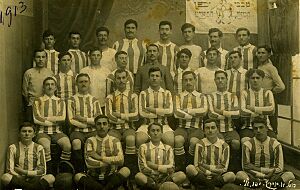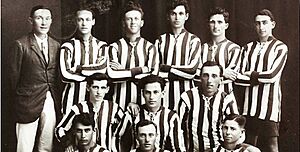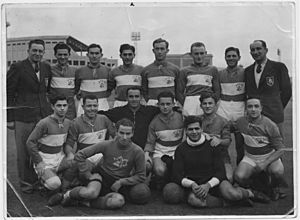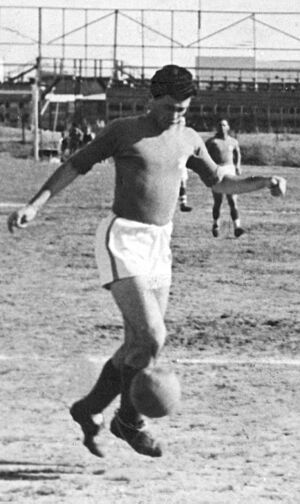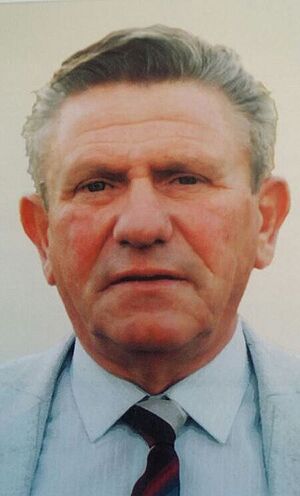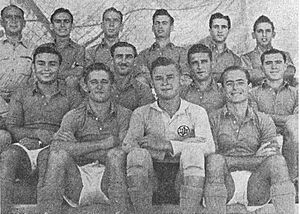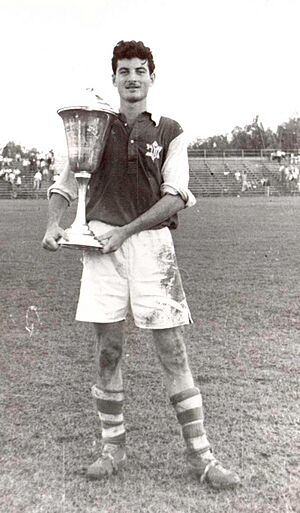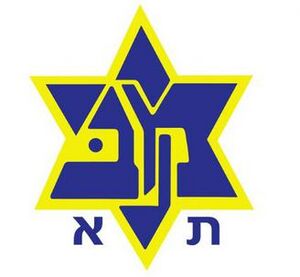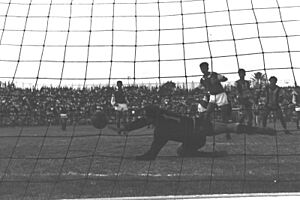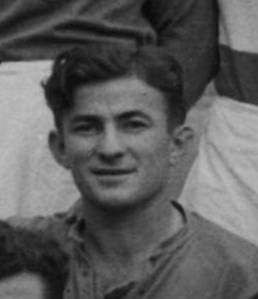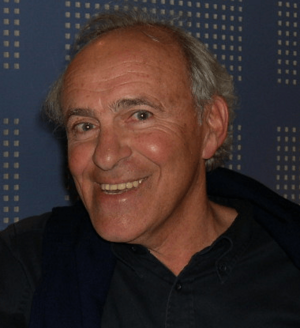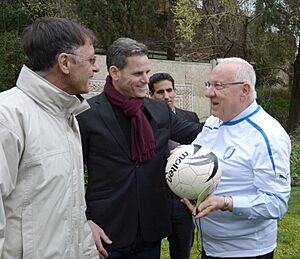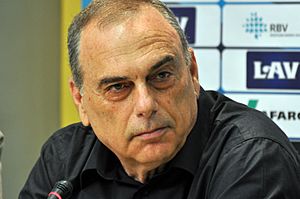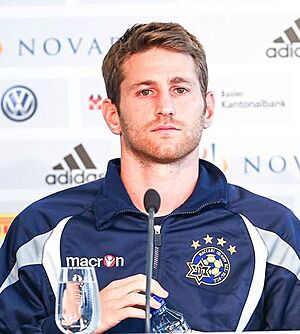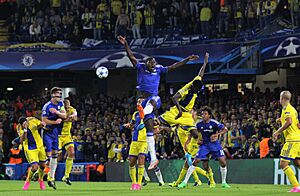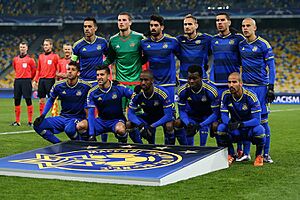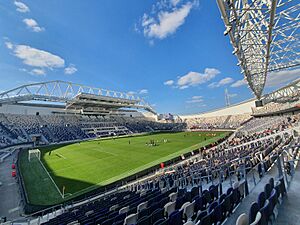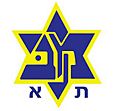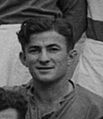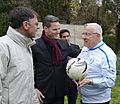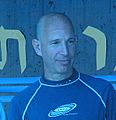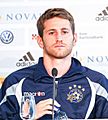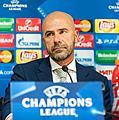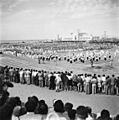Maccabi Tel Aviv F.C. facts for kids
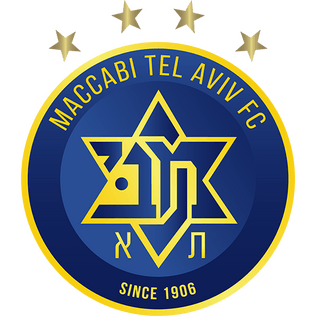 |
||||
| Full name | Maccabi Tel Aviv Football Club | |||
|---|---|---|---|---|
| Nickname(s) | Maccabi The Yellows |
|||
| Short name | MTA | |||
| Founded | 1906 | |||
| Ground | Bloomfield Stadium, Tel Aviv, Israel | |||
| Capacity | 29,400 | |||
| Owner | Mitchell Goldhar | |||
| Chairman | Jack Angelides | |||
| Coach | Žarko Lazetić | |||
| League | Israeli Premier League | |||
| 2021–22 | Israeli Premier League, 3rd of 14 | |||
|
||||
Maccabi Tel Aviv Football Club (Hebrew: מועדון כדורגל מכבי תל אביב; Moadon Kaduregel Maccabi Tel Aviv) is a professional football club from Tel Aviv, Israel. It is part of the Maccabi Tel Aviv Sport Club.
Founded in 1906 in Jaffa, it is the oldest football club in Israel. When the city of Tel Aviv was created in 1909, the club changed its name to Maccabi Tel Aviv. In 1922, it became the first Jewish football club to play in local competitions. The name Maccabi comes from the Maccabees, an ancient Jewish warrior family. The club's logo, the Star of David, also represents the Jewish people. Maccabi Tel Aviv has won more titles than any other Israeli club. They have won 26 League Championships, 24 State Cups, 8 Toto (League) Cups, and 2 Asian Champion Club Tournaments. They won these Asian titles before Israel left the AFC in 1974.
Maccabi Tel Aviv is the only football team that has never been moved down from the Israeli Premier League. They are also one of only three Israeli teams to reach the UEFA Champions League group stage. The club focuses on developing young talent. They run three football academies in the Tel Aviv area for over 750 children aged 6–15. They also have 17 youth teams with 400 players between 9 and 19 years old. These teams often do very well in local and national leagues.
Contents
Club History
Early Years (Before 1950)
In the early 1920s, Maccabi Tel Aviv was known as the strongest football team in Palestine. They played many friendly matches, even against British teams. Official tournaments started in 1928. In 1929, the team won its first trophy by beating Maccabi Hashmonai Jerusalem 4–0. Maccabi won the championship again in 1930 and 1933.
In 1936, the club was invited to play in the United States. They played in France on their way there. In the United States, Maccabi beat the New York City All-star team in front of 50,000 fans at Yankee Stadium. They also played in Canada.
After returning from the United States, Maccabi players went on strike because they had not been paid. In 1937, their demands were met, and they ended the strike. That year, Maccabi Tel Aviv won their first league title. In 1939, they won their second championship. After that season, Maccabi went on another tour, this time to Australia. They played 18 games, winning 11 of them.
In 1941, Maccabi won their first "double". This means they won both the league and the State Cup. They beat Hapoel Tel Aviv 2–1 in the final. The league was stopped during World War II, but Maccabi kept playing friendly matches. In 1946, the State Cup returned, and Maccabi won it. In 1947, the league started again, and Maccabi won it. They also reached the cup final. In a match against Beitar Tel Aviv, Maccabi won a second double.
The Golden Age (1950s)
The 1950s are known as Maccabi Tel Aviv's "Golden Age." During this time, they won five championships and four Israel Football Association Cups. This successful period started with Israel becoming a state. Maccabi Tel Aviv won the league title in the 1949–50 season. They won the deciding match against Hapoel Tel Aviv 1–0. Key players like Yosef "Yosale" Merimovich, Itzhak Schneor, Eli Fuchs, Avraham Bandouri, Zvi Studinski, and Yehoshua "Shiye" Glazer made Maccabi Tel Aviv very strong. Glazer was the top scorer in 1952 with 27 goals.
In the 1951–52 season, Maccabi won their second league title since Israel was founded. They were eight points ahead of Maccabi Petah Tikva. In the 1953–54 season, they won an historic first double. They won the league again and crushed Maccabi Netanya 4–0 in the Cup final.
The Hapoel Petah Tikva team became strong in the next season and won the championship. However, Maccabi Tel Aviv still won the IFA Cup, beating Hapoel Petah Tikva 3–1. Maccabi went on to beat them for the league title in 1955–56 and 1957–58. This completed their fifth National Championship in the first ten years of modern Israel. In 1957–58, they also won a double, beating Hapoel Haifa 2–0 in the IFA Cup final.
The following season, Maccabi Tel Aviv won their second straight IFA Cup. They had a 4–0 lead with ten minutes left, but Hapoel Petah Tikva scored three quick goals. Maccabi held on to win, making it a very exciting finish.
Challenges and Triumphs (1960s)
After the successful 1950s, Maccabi Tel Aviv faced strong competition from HaPoel Petach Tikva. In 1960, Maccabi lost the league title on the last day of the season. Rafi Levi, one of the club's best strikers, was the league's top scorer with 19 goals. A year later, the famous Brazilian club Santos, with Pelé, played a friendly match against a combined team of Maccabi Tel Aviv and Hapoel Petah Tikva. Santos won 3–1.
Maccabi Tel Aviv slowly improved under coach Jerry Beit haLevi. In the 1963–64 season, they won the Israel Football Association Cup. They won again in 1964–65 and a third IFA Cup in 1966–67. This time, they beat city rivals Hapoel Tel Aviv 2–1.
The league was paused by the Six-Day War and finished in 1968. Maccabi Tel Aviv, coached by Israel Halivner, won their only championship of the decade. The most memorable event was Maccabi winning the Asian Champion Club Tournament in 1969. They became the second Israeli club to win an international competition. Coached by Yosef Merimovich, Maccabi beat South Korean team Yangzee FC in extra time.
Even though it was a tougher decade, Maccabi still won one championship and three Israel Football Association Cups. Important players included Nissim Bachar, Meir Nimni, Menachem "Miko" Bello, Tzvika Rosen, Haim Levin, Moshe Asis, Rafi Levi, and Giora Spiegel.
New Beginnings (1970s)
The 1970s started well for Maccabi Tel Aviv. Under coach David Schweitzer, the team won an historic double in the very first year. They won the Israeli Football Association (IFA) Cup final 2–1 against Maccabi Netanya. They won the league title based on goal difference, partly thanks to a 5–0 win over Hapoel Tel Aviv. In that game, Maccabi midfielder Giora Shpiegel scored three goals.
The next season was not as good, with Maccabi finishing tenth. But just one year later, in 1971–72, they won their second championship of the decade. Dror Bar Nur, one of the club's best strikers, scored 16 league goals that season.
Four years later, Maccabi Tel Aviv was fighting to avoid being moved down to a lower league. They beat Beitar Jerusalem 2–0 to stay in the top league. In April of that year, the English team Queens Park Rangers played a friendly match against Maccabi Tel Aviv. Maccabi won 2–1.
A year later, Maccabi Tel Aviv went from almost being relegated to winning the league. In the 1976–77 season, they won their second double of the decade. They won the title three points ahead of Maccabi Jaffa. Striker Vicky Peretz was the league's top scorer with 17 goals. Benny Tabak's goal against Beitar Tel Aviv won Maccabi the IFA Cup.
Great Maccabi players from this time included strikers Benny Tabak and Vicky Peretz, and the famous defender Avi Cohen. Avi Cohen was known as "Libero" because he could move freely from his defensive position to help with attacks. He scored a memorable goal in a 2–0 derby win over Hapoel Tel Aviv in 1978. Vicky Peretz scored 67 goals for the club, and Benny Tabak scored 121 goals.
The "Thin Years" (1980s)
The 1980s were not as successful for Maccabi Tel Aviv FC, earning the nickname "the thin years." They won two Israel Football Association (IFA) Cups but no league titles. The first of these Cup wins was in 1986–87 against Maccabi Haifa. The game ended 3–3 after extra time and was decided by a penalty shoot-out. Striker Benny Tabak scored the winning penalty.
The next season, Maccabi Tel Aviv had their worst defeat ever, losing 0–10 to Maccabi Haifa. But only three weeks later, they played in their second straight IFA Cup final against Hapoel Tel Aviv. They won 2–1 with goals from Mickey Cohen and Benny Tabak.
Another memorable moment in the 1980s happened in a match against Beitar Jerusalem in 1981–82. The referee disallowed a Beitar goal, but the players kept celebrating. Maccabi defender Menahem "Miko" Belo quickly restarted play, passing to midfielder Moti Ivanir. Ivanir scored, leading to a 2–1 Maccabi victory.
Despite the team's struggles, some players stood out. These included Moti Ivanir, Alon Natan, goalkeeper Bonni Ginzburg, and striker Eli Driks. Ivanir scored 67 goals for the club. Alon Natan scored 40 goals before an injury forced him to retire early.
Bonni Ginzburg was Maccabi's goalkeeper until 1987–88. He played for the national team and later became the first Israeli goalkeeper to play abroad. Eli Driks, one of the club's all-time best strikers, started his career in the 1980s and played for Maccabi for 20 years.
A Decade of Success (1990s)
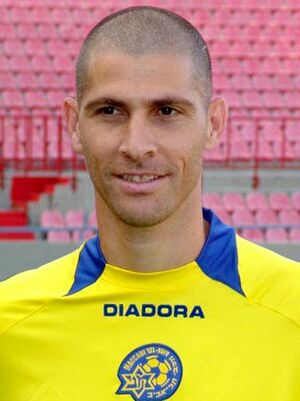
After the tough 1980s, a young coach named Avram Grant took over Maccabi Tel Aviv. He brought in many young players, leading to one of the club's most successful decades. By the middle of the 1990s, the team had won an historic "double," two more championships, two State Cups, and one Toto (League) Cup. Two more Toto Cups were added by the end of the decade. Maccabi Tel Aviv became a top team in Israeli football again.
It all began in the 1991–92 season. With great talent and attacking football under Avraham Grant, Maccabi Tel Aviv won the league championship for the first time in thirteen years. Key new players included Russian goalkeeper Alexander Ubarov, who became a club legend, and defender Alexander Polukarov. Along with midfielder Uri Malmilyan and young players Avi Nimni and Itzik Zohar, they brought Maccabi Tel Aviv back to the top. In 1992–93, after winning the Toto (League) Cup, this talented group won the State Cup. Goals by Itsik Zohar and Nir Klinger secured the win against Hapoel Tel Aviv. They finished with 88 points but lost the league title to Maccabi Haifa, who played the whole season without a loss. But the next season, Grant's team won the championship dramatically with Alon Brumer's famous goal in Beer Sheva.
In 1995, a new group took over Maccabi Tel Aviv. Dror Kashtan became the new coach after Avraham Grant left. This was one of the club's best seasons. Their main rivals were Maccabi Haifa. In a crucial match, Maccabi Tel Aviv was losing 1–0 at halftime. Coach Kashtan made his players wait on the field for the second half. In the second half, goals by Eli Dricks, Nir Klinger, and Avi Nimni turned the game around, leading to a 3–1 victory. This win helped Maccabi Tel Aviv win the championship and then the "double" after a 4–1 win over Hapoel Rishon Lezion in the State Cup final.
When Israel joined European football in 1992, Maccabi Tel Aviv also started playing in these big competitions. In 1992–93, Maccabi Tel Aviv played in UEFA Champions League qualifiers for the first time. They beat Valletta but lost to Club Brugge. In 1994–95, they were knocked out of the UEFA Cup Winners' Cup by Werder Bremen. The next season, they almost reached the Champions League group stages but lost to Grasshopper. In 1996, they lost to Fenerbahçe in Champions League qualifiers and then to Tenerife in the UEFA Cup. In 1999–00, Maccabi beat FBK Kaunas but then lost to Lens.
The 1990s saw many talented players at Maccabi Tel Aviv. These included defenders Amir Shelach and the Brumer brothers, Gadi and Alon. Also, midfielder Noam Shoham and strikers Meir Melika and Nir Sivilia. The team was led by captain Nir Klinger, free-kick specialist Itzik Zohar, and perhaps the greatest player in Maccabi Tel Aviv's history, midfielder Avi Nimni. In 1997, Loni Herzikovich took over the club.
The New Millennium (2000s)
The 2000s started very well for Maccabi Tel Aviv, with coach Nir Klinger promoting an attacking style of football. They won two State Cups in a row. The first was in the 2000–01 season. Maccabi finished fourth in the league but scored the most goals (71). They famously beat Beitar Jerusalem 7–0 and Hapoel Rishon Lezion 10–1. This strong attack led to them winning the State Cup with a 3–0 victory over Maccabi Petah Tikva.
The next season, 2001–02, is remembered for a sad event. On January 26, 2002, during a match against Beitar Jerusalem, Maccabi defender Meni Levi suddenly collapsed. He was rushed to the hospital, and the game was stopped. Levi unfortunately could not recover, and the club decided to retire his number twelve jersey. Despite this tragedy, the team recovered and won their second State Cup in a row. They won a penalty shoot-out against league champions Maccabi Haifa after a 0–0 draw.
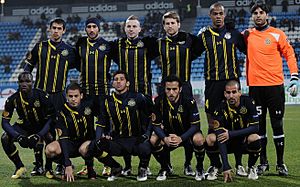
The following season, 2002–03, Maccabi Tel Aviv won a dramatic league championship over Maccabi Haifa. On the last day, Maccabi Tel Aviv was ahead on goal difference. They scored three goals in the second half against Hapoel Petah Tikva to win the championship.
Maccabi's biggest achievement of the decade was reaching the group stages of the Champions League in the 2004–05 season. They beat Greek team PAOK Thessaloniki to become Israel's second club to reach this stage. They were in a tough group with Bayern Munich, Juventus, and Ajax. Still, Maccabi earned four points, beating Ajax and drawing with Juventus at home. They also won the State Cup that year, beating Maccabi Herzliya in a penalty shoot-out.
After this, Maccabi's performance in the league dropped. The 2005–06 season was called "the Galacticos season" because it had many star players like Eyal Berkovic, Đovani Roso, and Avi Nimni. But despite these stars, Maccabi finished in the bottom half of the table.
In 2007, billionaire Alex Shnaider took over the club. He invested a lot of money to pay off debts and develop the youth department. In 2009, Shnaider passed the team to another Canadian billionaire, Mitchell Goldhar, for free, but with a promise to pay the club's debts.
Recent Years (2010s and 2020s)
In the 2010–11 season, Maccabi had a good moment in Europe, beating a strong Greek team Olympiacos 1–0 at home in the UEFA Europa League qualifiers. They then lost to French giants Paris Saint-Germain. The next season, Maccabi had a famous 3–0 victory against Greek team Panathinaikos in Europa League qualifiers. They reached the group stage but only got two points.
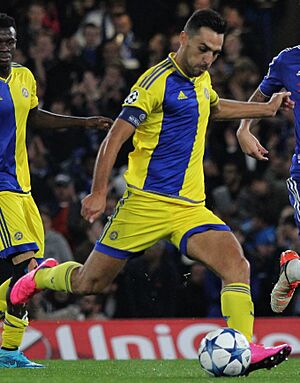
The 2012–13 season ended Maccabi Tel Aviv's league struggles. They won their first championship in ten years. Under Director of Football Jordi Cruyff and coach Óscar García, Maccabi dominated the league, winning by thirteen points. They scored the most goals (78) and let in the fewest (30). Top scorers included Eliran Atar (22 goals), Maharan Radi (8 goals, 11 assists), Mu'nas Dabbur (10 goals), and new players Rade Prica (8 goals) and Eran Zahavi (7 goals). The defense was strong with Eitan Tibi, Carlos García, and goalkeeper Vincent Enyeama.
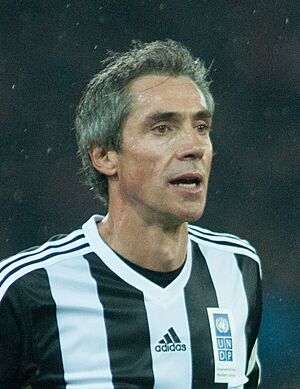
In 2013–14, Paulo Sousa replaced Oscar Garcia as coach. The team continued its success and won another championship, thanks to Eran Zahavi's goals. They also did well in the UEFA Europa League, reaching the round of 32 before losing to Basel.
The 2014–15 season had a tough start. Games were played away from Israel due to conflict, and Maccabi was knocked out of both the Champions League and Europa League qualifiers. Coaches changed, with Óscar García returning briefly before Pako Ayestarán took over. During a Tel Aviv Derby in November 2014, a fan ran onto the pitch to attack Maccabi star Eran Zahavi. Zahavi defended himself and was shown a red card. Both teams lost a point and forfeited the match. Despite this, Maccabi Tel Aviv became the first Israeli team to win all three local trophies: the Premier League, the State Cup, and the Toto Cup. Eran Zahavi was the best player, breaking the Israeli record for consecutive scoring games with 27 goals.
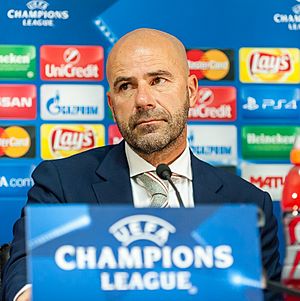
In 2015–16, the team reached the UEFA Champions League group stage for the first time in 11 years. They were in a group with Chelsea, Porto, and Dynamo Kyiv. Maccabi lost all six group games, scoring only one goal and letting in 16. In the league, Maccabi competed with Hapoel Be'er Sheva for the title. Coach Slavisa Jokanovic left and was replaced by Peter Bosz. Eran Zahavi broke the goalscoring record with over 31 goals in one league season. In the final game, Maccabi won 6–0 against Haifa, but Be'er Sheva also won, so Be'er Sheva became champions. Maccabi lost the State Cup Final to Maccabi Haifa, ending the season without a trophy. Eran Zahavi was sold to Guangzhou R&F for 8.5 million dollars.
The next season, Shota Arveladze became Head Coach. The club reached the Europa League Group stages. Maccabi beat Hapoel Tel Aviv 5–0, matching their biggest derby win from 1969–70. Arveladze left, and Lito Vidigal took over. The team finished second in the league and lost in the Cup Final.
Jordi Cruyff became Head Coach for the 2017–18 season. The club reached the Europa League Group Stage again, even beating Villarreal 1–0 in Spain. Maccabi won the Toto Cup and finished second in the league.
Vladimir Ivic became head coach in 2018–19. Under him, Maccabi had an amazing season, setting many records. They won the league championship by a huge 31-point lead, earning 89 points (a club record). They won the title by the end of March, earlier than ever before. The club also won the Toto Cup for the second year in a row.
The following season, under Ivic, the team continued their success and won a second league title in a row. During that season, Maccabi did not let in any goals for 14 matches and only conceded 10 league goals in total, breaking all Israeli records. Ivic left his role as coach at the end of the season.
Ahead of the 2020–21 season, Giorgos Donis became the new coach. The club won two more titles: the Super Cup and the Toto Cup.
In June 2023, Maccabi appointed Robbie Keane as their next coach. As of July 2025, Žarko Lazetić is the head coach.
Club Rivalries
Rivalry with Hapoel Tel Aviv
Maccabi's main rivals are Hapoel Tel Aviv. Matches between these two teams are called the "Tel Aviv derby" and get a lot of attention in Israel.
Rivalry with Maccabi Haifa
Another strong rival is Maccabi Haifa. These two are the most successful Israeli football clubs. Their games are sometimes called "the Israeli Classico" or "the derby of Israel." They compete for the top spot in Israeli soccer.
Home Grounds and Training Facilities
Bloomfield Stadium
Bloomfield Stadium in Tel Aviv is the team's home stadium. It can hold 29,400 fans. Maccabi has played there since 1969. Gate 11 is where the main fan group, the Maccabi Fanatics, leads the cheering.
Kiryat Shalom Training Ground
The Maccabi Tel Aviv Training Ground is in south Tel Aviv. The different Maccabi Tel Aviv teams started practicing there in the mid-1970s. The facility has four pitches for all the teams, two gyms, treatment rooms, and classrooms. The main team practices on a large pitch near the locker rooms, with seating for about 100 fans.
On March 6, 2012, the Youth Division Complex was named after the late Avi Cohen.
There is also a synthetic pitch, one of the first in Israel, used by the Youth Division. The Youth Division's central pitch has seating for over 200 and is used for Under-19 games. The complex has ten dressing rooms and an exercise room for the Youth Division.
Club Honours
Maccabi Tel Aviv has won many titles throughout its history.
Domestic Competitions
League
- Israeli Championships
- Champions (26): 1935–36, 1937, 1939, 1941–42, 1946–47, 1966–68, 1969–70, 1971–72, 1976–77, 1978–79, 1991–92, 1994–95, 1995–96, 2002–03, 2012–13, 2013–14, 2014–15, 2018–19, 2019–20, 2023–24, 2024–25
- Runners-up (13): 1954–55, 1959–60, 1965–66, 1968–69, 1973–74, 1992–93, 1993–94, 1998–99, 2003–04, 2015–16, 2016–17, 2017–18, 2020–21
Cups
- State Cup
- Winners (24): 1929, 1930, 1933, 1941, 1946, 1947, 1953–54, 1954–55, 1957–58, 1958–59, 1963–64, 1964–65, 1966–67, 1969–70, 1976–77, 1986–87, 1987–88, 1993–94, 1995–96, 2000–01, 2001–02, 2004–05, 2014–15, 2020–21
- Runners-up (13): 1934, 1938, 1940, 1951–52, 1961–62, 1975–76, 1978–79, 1982–83, 1991–92, 1992–93, 1996–97, 2015–16, 2016–17
- Toto Cup
- Winners (9): 1992–93, 1998–99, 2008–09, 2014–15, 2017–18, 2018–19, 2020–21, 2023–24, 2024–25
- Runners-up (4): 1991–92, 1994–95, 1997–98, 2019–20
- Israel Super Cup
- Winners (8): 1965 (shared), 1968, 1977, 1979, 1988, 2019, 2020, 2024
- Runners-up (4): 1970, 2015, 2021, 2025
- Lilian Cup
- Winners (2): 1985–86, 1986–87
European Competitions
- UEFA Champions League
- Group stage: 2004–05, 2015–16
- UEFA Europa League
- Round of 32: 2013–14, 2020–21
- League phase: 2024–25
- Group stage: 2011–12, 2016–17, 2017–18
- UEFA Europa Conference League
- Round of 16: 2023–24
- Knockout round play-offs: 2021–22
Asian Competitions
- Asian Champion Club Tournament
- Winners (2): 1969, 1971
Championships Before 1948
There was some discussion about how many championships the team won before Israel became a state in 1948. The Israel Football Association now officially recognizes Maccabi's 1939 championship. This means Maccabi Tel Aviv has won 26 total championships.
Club Records
- Seasons in top division – 69 (1949–present), the only team never to be moved down.
- Lowest league position – 12th (1987–88).
- Double seasons – 7 (1946–47, 1953–54, 1957–58, 1969–1970, 1976–77, 1995–96, 2014–15).
- Invincible seasons – 2 (1953–54, 1957–58), meaning no losses in the league and State Cup.
- Biggest 'undefeated' streak in the league – 44 matches (October 11, 1951 – May 3, 1955).
- Most points in a season – 89 (2018–2019).
- Most 'league goals for' in a season (club) – 103 (1949–50).
- Lowest number of 'league goals against' in a season (club) – 10 (2019–20).
- Most goals in a season (player) – 35, Eran Zahavi, 2015–16.
- Biggest win – 13–0 vs Maccabi Rishon LeZion, 1950.
- Biggest defeat – 10–0 vs Maccabi Haifa, 1988.
- All-time top scorer – Avi Nimni, 174 goals.
- All-time most appearances – Menachem Bello, 498 games.
Images for kids
See also
 In Spanish: Maccabi Tel Aviv Football Club para niños
In Spanish: Maccabi Tel Aviv Football Club para niños
 | Shirley Ann Jackson |
 | Garett Morgan |
 | J. Ernest Wilkins Jr. |
 | Elijah McCoy |


